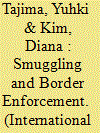| Srl | Item |
| 1 |
ID:
172727


|
|
|
|
|
| Summary/Abstract |
In 2011, the American Political Science Association stated that integrating issues of diversity, inclusiveness, and equality into political science curriculum and pedagogy was crucial to the success of the discipline in the twenty-first century. Although consensus is forming about the need to teach diversity, the question of how to do this effectively remains open. This article describes an archives-based assignment in an introduction to American government course created by the authors of this article—a professor of political science and the college archivist—that includes greater understanding of diversity and engaged citizenship as learning objectives. For this assignment, students are immersed in archival material about their own college and tasked with analyzing the political actions of previous generations of students as the civil rights and women’s movements emerged, as the student population became more diverse, and as the campus reacted to national and local events relating to racial intolerance and injustice. By examining their college’s political past—both the conflicts that animated the community and the student-led efforts to make the campus more inclusive—current students engage with issues of diversity and political activism in a way that helps them better understand themselves and their role as citizens in a democratic nation.
|
|
|
|
|
|
|
|
|
|
|
|
|
|
|
|
| 2 |
ID:
188387


|
|
|
|
|
| Summary/Abstract |
This article analyzes the efficacy of border enforcement against smuggling. We argue that walls, fences, patrols, and other efforts to secure porous borders can reduce smuggling, but only in the absence of collusion between smugglers and state agents at official border crossings. When such corruption occurs, border enforcement merely diverts smuggling flows without reducing their overall volume. We also identify the conditions under which corruption occurs and characterize border enforcement as a sorting mechanism that allows high-skilled smugglers to forge alternative border-crossing routes while deterring low-skilled smugglers or driving them to bribe local border agents. Combining a formal model and an archival case study of opium smuggling in Southeast Asia, we demonstrate that border enforcement has conditional effects on the routes and volumes of smuggling, depending on the nature of interactions between smugglers and border agents. By drawing attention to the technological and organizational aspects of smuggling, this article brings scholarship on criminal governance into the study of international relations, and contributes to debates on the effects of border enforcement and border politics more generally.
|
|
|
|
|
|
|
|
|
|
|
|
|
|
|
|